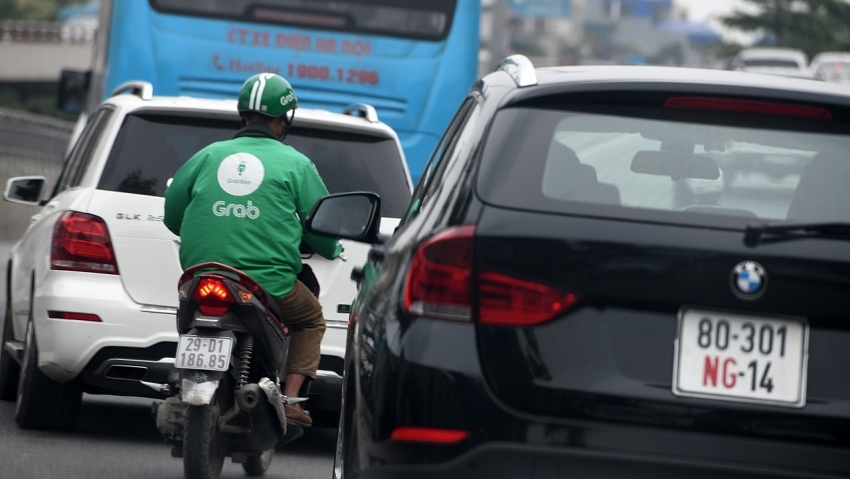New measures protect Grab users against 'excessive' surge prices, but no restoring of discounts expected
 |
| New measures protect Grab users against 'excessive' surge prices, but no restoring of discounts expected, photo AFP |
| Singapore competition watchdog fines Grab, Uber S$13 million in total over merger deal |
According to the CCCS, this is to protect the interests of passengers by ensuring that base fares remain at the same level as before Grab's acquisition deal with Uber and that surge multipliers, which cause fares to rise when demand is high, are capped.
At a media conference on Monday (Sep 24), CCCS Director (Business and Economics) Herbert Fung explained how the prices are capped but stressed that the measures do not affect Grab's flexibility to apply dynamic pricing under normal demand and supply conditions.
"Grab practises dynamic pricing, which means that during peak hours prices can go up," said Mr Fung.
"So they have an algorithm to calculate that. Prices can change during the day, we are not disallowing this dynamic pricing to happen, but they cannot modify their algorithm to exercise market power and make it more expensive."
While the cap cannot be disclosed, Mr Fung said it is sufficient to lessen the impact on consumers.
In response to queries from Channel NewsAsia, a Grab spokesperson said that the company has not raised its prices since the merger deal.
"Grab will continue to adhere to our pre-transaction pricing model, pricing policies and driver commissions. We have been and will continue to submit weekly pricing data to the CCCS for monitoring," the spokesperson said, adding that it does not foresee the measures impacting its business.
Singapore University of Social Sciences (SUSS) transport researcher Walter Theseira said the measures imply that the current pricing structure will essentially remain.
"I don’t think the rulings are going to make any meaningful difference in prices at the moment. It will certainly stop Grab from pricing up but it certainly would not lead to any fall in prices."
NO RESTORING OF GRAB DISCOUNTS
Dr Theseira also noted that the measures did not include requiring Grab to restore the promotions and discounts it used to offer when Uber was still around.
"I do not think it would make business sense for Grab to do this, and I find it unlikely that we will go back to the old days of Grab (giving passengers) high discounts for rides," he said.
Speaking at Monday's conference, Chief Executive for CCCS Toh Han Li said that the measures are not meant to control the discounts given to commuters because the competition watchdog "prefers to leave that to the market".
"You don’t want to make the barrier of entry too high for competitors. Otherwise competitors will have to match the aggressive discounting, and that will make it even more costly to enter the market," said Mr Toh, who reiterated that a key reason for the measures was to open the door for a new company to take over the market share vacated by Uber in March.
However, Dr Theseira believes that even if another big ride-hailing company like Go Jek enters the Singapore market, Grab is unlikely to offer big discounts as it had before.
"They can do (this) against any competitor, and then they win, and then a new competitor comes and they have to do it again. Then it becomes clear to funders that this practice is just setting fire to their money," he said.
"So I think funders are losing patience with this idea that the path to victory is just though aggressive discounting."
On whether the S$6.42 million fine was a slap on the wrist for Grab, given that the company managed to secure S$2 billion in its last round of financing, Mr Toh said the measures should be looked at in totality.
"There is a certainly an impact on (Grab's) profit from the measures, because the facilitation of new entrants would of course provide for more competition. It's really a package," he said.
Dr Theseira believes the fine was not aimed at the company's profits.
"It's really more about sending a signal that if (Grab) is in a position to have known that the merger would arouse competition concerns, then it's irresponsible of you to attempt to rush ahead and do it, so it becomes impossible for the authorities to stop it," he explained.
Grab said that it will review CCCS' final decision in detail before making a decision if it wants to appeal the fine.
Grab transport ride-hailing
What the stars mean:
★ Poor ★ ★ Promising ★★★ Good ★★★★ Very good ★★★★★ Exceptional
Themes: Ride-hailing services
Related Contents
Latest News
More News
- Shopee and TikTok Shop account for 8 per cent of Vietnam’s retail market (January 16, 2026 | 00:00)
- Human-centred governance seen as key to AI development (December 19, 2025 | 18:19)
- TECHFEST Vietnam 2025 links startups with policy and capital (December 15, 2025 | 18:21)
- Long Thanh International Airport welcomes first Vietnam Airlines test flight (December 15, 2025 | 18:01)
- Foreign fruits flood Vietnamese market (December 09, 2025 | 13:22)
- Vietnam’s fruit and vegetable exports reach $7.8 billion in first 11 months (December 05, 2025 | 13:50)
- Vietnam shapes next-generation carbon market (November 26, 2025 | 15:33)
- PM urges Ho Chi Minh City to innovate and remain Vietnam’s economic locomotive (November 26, 2025 | 15:29)
- Experts chart Vietnam's digital finance path: high hopes, high stakes (November 14, 2025 | 10:56)
- Vietnam’s seafood imports surge 30 per cent in first 10 months (November 10, 2025 | 19:35)

 Tag:
Tag:




















 Mobile Version
Mobile Version